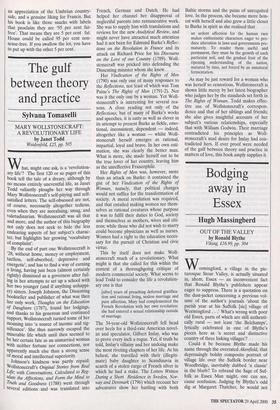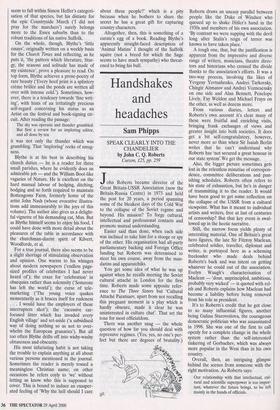Bodging away in Essex
Hugh Massingberd
OUT OF THE VALLEY by Ronald Blythe Viking, £16.99, pp. 304 Wormingford, a village in the pic- turesque Stour Valley, is actually situated in, ahem, Essex — an inconvenient fact that Ronald Blythe's publishers appear eager to suppress. There is a quotation on the dust-jacket concerning a previous vol- ume of the author's journals 'about the parish year at his Suffolk [sic] village of Wormingford . . .' What's wrong with poor old Essex, parts of which are still authenti- cally rural — not least 'the Belchamps', lyrically celebrated in one of Blythe's pieces here as 'a secret and distinctive country of three linking villages'?
Could it be because Blythe made his name through the overrated Akenfield, that depressingly bolshy composite portrait of village life over the Suffolk border near Woodbridge, inevitably dubbed 'a classic' in the blurb? To rebrand the Sage of Suf- folk as Essex Man might, one can see, cause confusion. Judging by Blythe's odd dig at Margaret Thatcher, he would not seem to fall within Simon Heifer's categori- sation of that species, but his distaste for the epic Countryside March CI did not pray for the marchers') surely belongs more to the Essex suburbs than to the robust traditions of his native Suffolk.
On the whole, though, Blythe's 'little essays', originally written on a weekly basis for the Church Times and reflecting, as he puts it, 'the pattern which literature, litur- gy, the seasons and solitude has made of my existence', prove a pleasure to read. On top form, Blythe achieves a prose-poetry of rare beauty ('Every hoof print is A splintery crème brtlee and the ponds are written all over with intense cold.'). Sometimes, how- ever, there is a tendency towards 'fine writ- ing', with hints of an irritatingly precious self-regard concerning his status as an Artist on the festival and book-signing cir- cuit. After reading the passage:
The sky was operatic and thunder grumbled. But first a review for an imploring editor, and all done by ten
it was not only the thunder which was grumbling. That 'imploring' reeks of smug- ness.
Blythe is at his best in describing his church duties — he is a reader for three small parishes, where he evidently does an admirable job — and the William Boot-like vagaries of Nature. He is excellent on the hard manual labour of hedging, ditching, bodging and so forth required to maintain Bottengoms Farm, formerly home of the artist John Nash (whose evocative illustra- tions add immeasurably to the joys of this volume). The author also gives us a delight- ful vignette of his demanding cat, Max. But as Blythe himself seems to enjoy his food, I could have done with more detail about the pleasures of the table in accordance with the churchman-diarist spirit of Kilvert, Woodforde, et al.
For a true journal, there also seems to be a slight shortage of stimulating observation and opinion. One warms to his whinges about modern newspapers ('endless page- sized profiles of celebrities I had never heard of); the craze for 'celebration' in obsequies rather than solemnity ('Someone has left the world'); the curse of tele- marketing (The young voice quakes momentarily as it braces itself for rudeness . . I would have the employers of these interrupters shot'); the 'excessive car- focused litter which has invaded every English village' and set-aside Ca subsidised way of doing nothing so as not to over- whelm the European granaries'). But all too often Blythe drifts off into wishy-washy obtuseness and obscurity.
His most infuriating habit is not taking the trouble to explain anything at all about various persons mentioned in the journal. Sometimes the reader is merely tossed a meaningless Christian name; on other occasions he refers coyly to 'we' without letting us know who this is supposed to cover. This is bound to induce an exasper- ated feeling of 'Why the hell should I care about these people?' which is a pity because when he bothers to share the secret he has a great gift for capturing country characters.
Altogether, then, this is something of a curate's egg of a book. Reading Blythe's apparently straight-faced description of 'Animal Matins' I thought of the Suffolk squire (not a breed for which the Sage seems to have much sympathy) who threat- ened to bring his bull.



























































 Previous page
Previous page